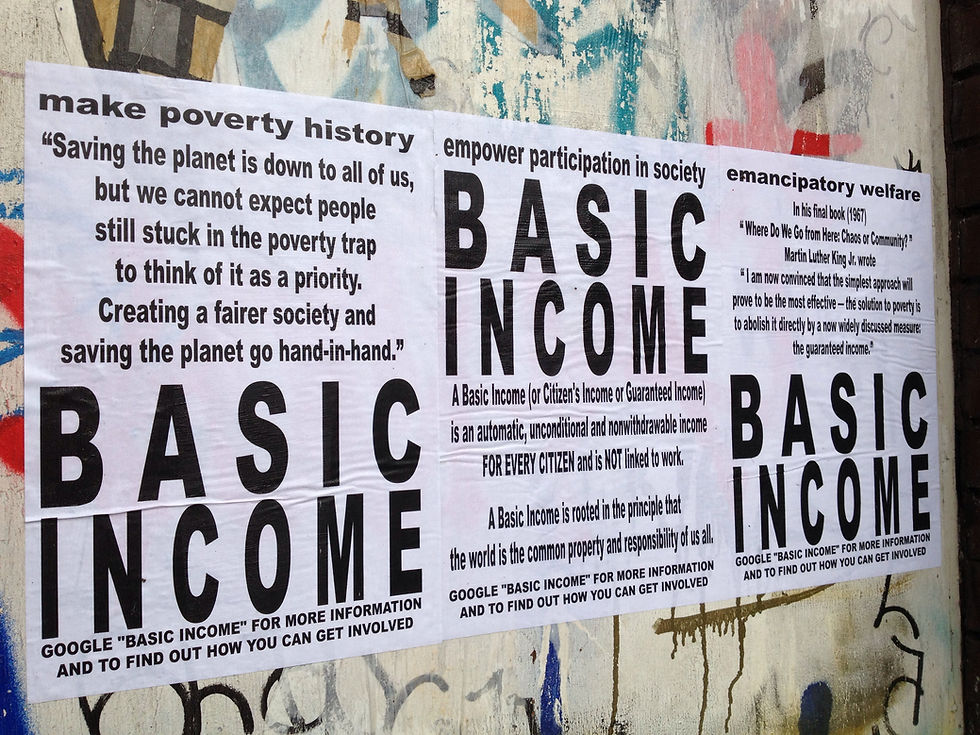Op-Ed: How Universal Basic Income Can Tackle Inequality in the UK
- Joshua Foster

- Dec 4, 2024
- 4 min read
Imagine a society where everyone has a guaranteed financial foundation—enough to cover the basics of life, no strings attached.
Universal Basic Income (UBI) promises to make this a reality. It’s an idea gaining momentum worldwide; here in the UK, it could be the transformative change we desperately need.
UBI—a regular, unconditional payment to every adult—has the potential to reshape our society. It’s not just a policy, it’s a vision for a more equal, resilient, and empowered nation.
Let’s explore why Britain is ready for this bold step.
The cost-of-living crisis is hitting millions of Britons hard. From soaring energy bills to eye-watering grocery prices, families across the country are struggling to keep their heads above water. Food bank use has surged to record levels, with the Trussell Trust distributing over 1.4 million emergency food parcels between 1 April and 30 September of this year.

UBI offers a lifeline. A regular, guaranteed payment would ensure no one has to choose between heating and eating. For someone earning minimum wage or balancing multiple part-time jobs, even a modest UBI of £800 per month could be a game-changer. It would provide stability in a world of rising rents and unpredictable expenses.
Automation is no longer a sci-fi fantasy—it’s here, and it’s changing how we work. From self-checkout machines in supermarkets to driverless vehicles on the horizon, jobs are vanishing. Research from PwC predicts that, by 2030, up to 30% of jobs in the UK could be automated. For workers in industries like retail or manufacturing, this is a looming crisis. But with UBI, we can turn a threat into an opportunity. A guaranteed income would give people the breathing space to retrain for new careers, start a small business, or even pursue creative ventures. Instead of fearing the robots, we could embrace innovation without leaving anyone behind.
The UK’s welfare system is notoriously complex and punitive. Universal Credit, once touted as a streamlined solution, has left many claimants trapped in bureaucratic red tape. Late payments, harsh sanctions, and means-testing create unnecessary stress for those already struggling.
UBI cuts through this mess. With a single, unconditional payment to everyone, it eliminates the need for constant form-filling and intrusive assessments. It’s a system built on trust and dignity—not suspicion.
UBI isn’t just a pipe dream—it’s been tested, and the results are promising. Take Finland, for instance. In 2017, 2,000 unemployed Finns were given a monthly income of €560. They reported lower stress levels, better mental health, and greater motivation to find work.
Meanwhile, in Kenya, an ongoing UBI programme run by the charity GiveDirectly is lifting entire villages out of poverty. Recipients have used their payments to start businesses, pay school fees, and improve their homes. Far from fostering laziness, UBI has unleashed human potential.
Here in the UK, Scotland has led the way with UBI feasibility studies in Fife, Glasgow, and Edinburgh. The findings? Significant support for UBI, with many researchers describing how, if implemented correctly, UBI could combat poverty, increase wellbeing, and reduce inequality.
The Royal Society of Arts published a report in which it suggested that every citizen under the age of 55 receive a “£5,000 opportunity dividend up for two years, taken at a time of their choosing over the course of a decade". Such dividends could be funded by reforming the tax system: by closing loopholes like those identified by Tax Justice UK, taxing wealth fairly, and reducing welfare administration costs. By investing in people, the UK could reap economic benefits, from higher consumer spending to reduced health and social care costs.
One common argument against UBI is that people would simply opt not to work. However, Finland’s trial actually led to an increase in employment. UBI removes the fear of financial ruin, allowing people to make meaningful choices about their lives. Some worry that giving everyone extra cash will drive up prices. However, some economists point out that inflationary risks can be managed by ensuring supply meets demand. In fact, because UBI simplifies welfare and reduces administrative costs, it could lead to overall economic stability.
“Universal Basic Income is utopian because we cannot get the politicians to do it — not because it does not work." — David Graeber.
Funding UBI isn’t about magic money trees; it’s about priorities. A wealth tax on the richest 1% could generate billions. Meanwhile, redirecting inefficient subsidies and tax breaks for corporations would free up additional funds. UBI isn’t a cost; it’s an investment in Britain’s future.
At its heart, UBI is about more than numbers; it’s about values. It recognises that every person deserves dignity and a basic level of security. In a country where millions feel left behind, UBI offers hope and empowerment.
Think of the single parent who could spend more time with their children instead of juggling three jobs. The carer who could finally afford to take a break. The young artist who could pursue their passion without fear of destitution. UBI unlocks human potential by giving everyone a foundation to build on.
UBI isn’t just a policy for the left or the right—it’s a vision for everyone. It’s about ensuring that in the 21st century, no one in the UK is left behind. I wish we could seize this opportunity to create a fairer, stronger Britain—one where every individual has the freedom to thrive.

_edited.png)



Comments